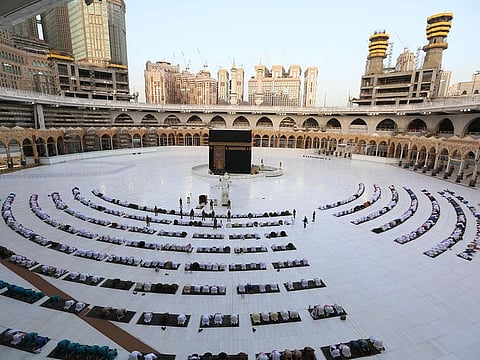Haj 2020 underway during the pandemic
Not only have lives been disrupted, coronavirus has tested people’s faith also

Also In This Package
The annual Haj has got underway in Saudi Arabia, albeit in a downsized format. Owing to the restrictions brought about by the coronavirus pandemic, this year the kingdom has gone along an executive strategic plan with strict health protocols in place.
The Saudi Ministry of Haj and Umrah has designated specific places for the arriving pilgrims to finalise their procedures and implement preventive measures set by the country’s health authorities.
This year only a few thousands will perform the annual Islamic pilgrimage.
During prayers, pilgrims have to keep themselves socially distanced from other worshippers, all part of regulations to ensure that the Haj takes place without a glitch and without anyone getting infectedGulf News
The six-day long ritual (during which the rites are performed) is a spiritual and religious journey for the faithful who carefully plan the trip over years.
Haj culminates with the Islamic holiday of Eid Al Adha or the Feast of Sacrifice. This year due to the coronavirus outbreak, numbers were greatly restricted with strict social distancing and sanitation measures put into effect.
People coming together
Haj, an important pillar of Islam, usually sees millions assembling in the holy cities of Mecca and Madinah. The pilgrims congregate in the holy cities over a six-day period, which brings people from all over the world together.
It will be a different experience this year with access to the Haj sites at Mina, Muzdalifah and Arafat given by special permits only.
The authorities are also making sure that all pilgrims wear masks, which have been made mandatory throughout the pilgrimage.
Measures have also been put in place to ensure that pebbles used for the ‘stoning of the devil’ ceremony are sanitised. Pilgrims will not be allowed to touch the Kaaba or kiss the black stone at its corner either.
Strict measures in place
During prayers, pilgrims have to keep themselves socially distanced from other worshippers, all part of regulations to ensure that the Haj takes place without a glitch and without anyone getting infected.
Saudi Arabia has been one of the hardest hit countries in the region. So far the country has close to 269,000 coronavirus cases with more than 2,760 deaths.
The kingdom, often lauded for its efficient preparations to manage Haj, has drawn praise by the World Health Organisation. WHO chief Tedros Ghebreyesus welcomed Saudi Arabia’s decision to significantly curtail the number of Haj pilgrims amid the ongoing COVID-19 crisis.
The pandemic has challenged the world in myriad ways. Not only have economies and lives been severely disrupted, coronavirus has also tested people’s faith.
To pull off the annual Haj pilgrimage in such a challenging situation is both commendable and uplifting.




